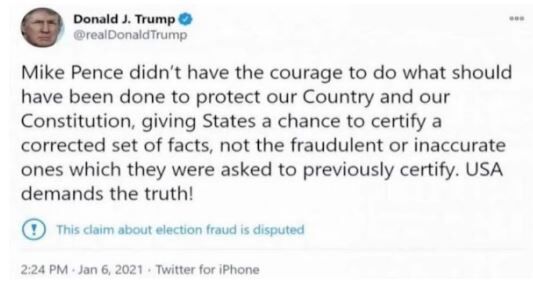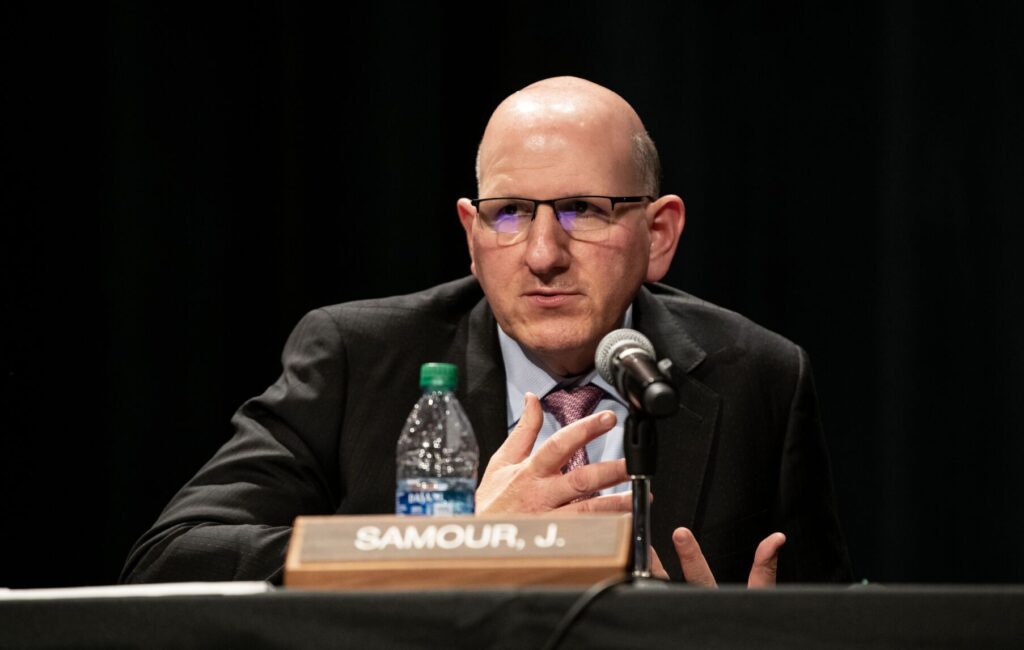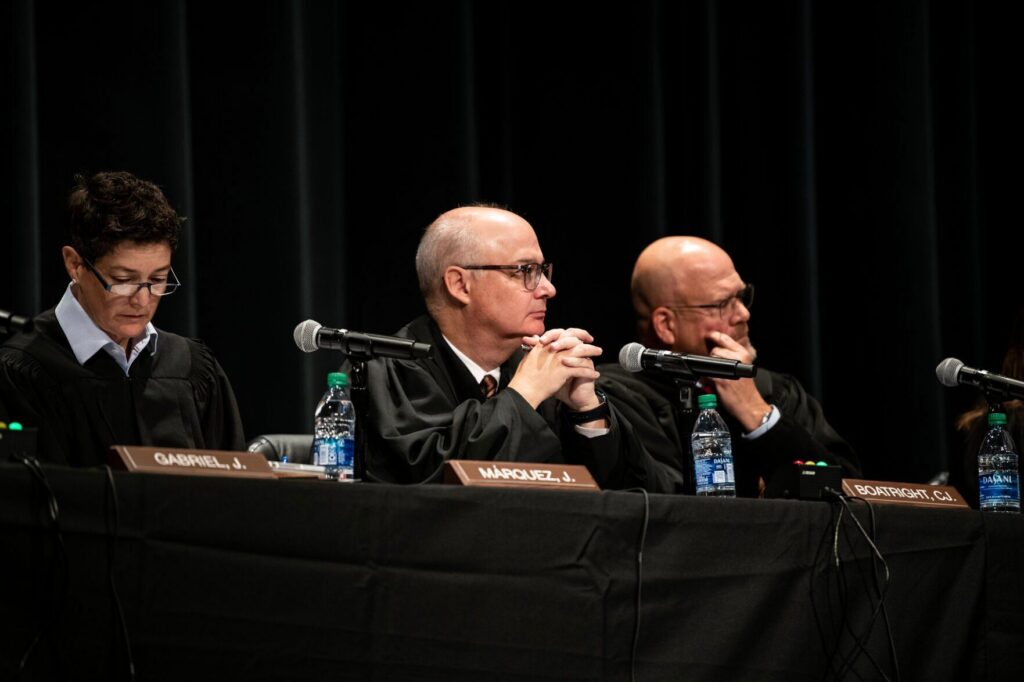Denver judge to rule soon on Trump’s ballot eligibility following closing arguments

After listening to closing arguments on Wednesday, a Denver judge could become the first in the country to rule the 14th Amendment’s prohibition on insurrectionists holding office applies to Donald Trump and, as a result, he is disqualified from Colorado’s 2024 presidential primary ballot.
Earlier this month, District Court Judge Sarah B. Wallace held a five-day hearing where she heard testimony and viewed evidence purporting to show Trump, through his actions leading up to Jan. 6, 2021, stoked the U.S. Capitol attack and intended to halt the certification of President Joe Biden’s victory.
Two weeks later, the parties returned to her courtroom to make their closing arguments.
“The rule of law must apply whether a candidate has no chance of winning an election or if they are a frontrunner,” said Sean Grimsley, an attorney for the four Republican and two unaffiliated voters who are seeking Trump’s disqualification. “Trump engaged in insurrection against the Constitution. The Constitution is clear. He cannot be president again.”
Trump’s attorney, Republican former Secretary of State Scott Gessler, stressed that Trump’s candidacy is an issue for voters and not subject to a judge’s views about the 14th Amendment.
“We vote on these issues,” he said. “To put it more crudely: When you have a hammer – when the court system is that hammer – not every problem is a nail.”
In recent weeks, multiple court decisions from other states have declined to wade into whether Section 3 of the 14th Amendment presents a barrier to Trump’s continued pursuit of the presidency. The post-Civil War provision bars members of Congress or “an officer of the United States” from occupying state or federal office if they took an oath to the U.S. Constitution but subsequently “engaged in insurrection.”
The rulings in New Hampshire, Minnesota and Michigan all went in Trump’s favor, with judges concluding it is not their role to resolve Trump’s current eligibility. However, the cases were markedly different from the one brought in Colorado, where a lengthy hearing featured more than a dozen witnesses, scores of social media posts and videos from the Jan. 6 riot.
Although Wallace did not ask questions during the arguments, she stated definitively that she had no intention of reversing her prior orders, in which she did not rule out her own ability to address the constitutional claims.
“Mr. Gessler may be right and I may be wrong. But that’s not what I plan on doing. I plan on issuing a decision on what was in the hearing,” Wallace said.
The petitioners are seeking an order under Colorado’s election procedures that would direct Secretary of State Jena Griswold to exclude Trump from the primary ballot, which must be certified by Jan. 5, 2024. Under their theory, Trump is ineligible to hold office because he took an oath to the Constitution covered by Section 3 and subsequently engaged in an insurrection.
Grimsley drew on expert testimony and Trump’s own words to argue Trump made claims before Election Day casting doubt on the integrity of the 2020 election. When he tried and failed to change the results through lawsuits, as a last-ditch effort, Trump called his supporters to D.C. on Jan. 6 for the purpose of disrupting the certification of Biden’s win, Grimsley continued.
“Trump argues the petitioners’ claims must be wrong because they’re unprecedented,” he said. “There’s a reason for that. Never before in the history of the United States has somebody who engaged in insurrection against the Constitution run for president after having taken an oath to protect that document. Never before has a sitting president sicced a mob on the Capitol while they were counting votes.”
Grimsley raised two key pieces of evidence: First, Trump’s speech to his supporters at the White House Ellipse prior to the Capitol siege, where he suggested the unproven claims of election fraud meant “you’re allowed to go by very different rules.” Second, Trump tweeted at 2:24 p.m., while the mob was assembled at the Capitol, that Vice President Mike Pence, who oversaw the counting of the electoral votes, “didn’t have the courage” to reject Biden’s electors.

“There is no innocent explanation for that tweet,” Grimsley said. “He had already decided the Constitution was not an obstacle.”
Gessler, on the other hand, spent large parts of his argument attempting to discredit the report of the congressional committee that found Trump bore responsibility for the Jan. 6 attack. Although the committee had seven Democratic and two Republican members, Gessler contended the investigation was biased toward the conclusion Trump engaged in an insurrection.
“Much of it was produced for TV,” he said. “Like it or not for the authors, President Trump remains viable and, in many instances, is considered a leading candidate for the presidency.”
He urged Wallace not to put significant weight on the committee’s findings. Gessler also attempted to downplay the petitioners’ comparison of their 14th Amendment witness, who had a history of scholarship on Section 3, with Trump’s witness, who by his own admission was not an expert on the disqualification provision.
“If they’re gonna say, ‘Our expert’s got a bigger resume than your expert,'” he said, “whatever.”
Finally, Gessler questioned the idea that Trump knowingly encouraged groups like the Proud Boys and the Oath Keepers – like when he told the Proud Boys to “stand back and stand by” during a televised debate. Gessler claimed the relationship was more akin to a stalker and their victim, where the victim does not intend to attract the stalker’s attention and adulation.
“That is, at best, unrequited love on the part of the far-right-wing extremists who may like President Trump, who may be inspired by President Trump, but there’s no evidence it went the other way,” he said.
An attorney for the Colorado Republican Party briefly argued that Griswold had no discretion to bar Trump from the ballot. The Colorado Attorney General’s Office also argued on behalf of Griswold that she has the duty to exclude disqualified candidates at the courts’ direction.
The official close of the hearing meant Wallace, by law, has 48 hours to issue a ruling – although Griswold’s lawyers contended she is not bound by that deadline. Prior to Wednesday, the parties submitted nearly 300 pages of proposed factual findings and legal conclusions for Wallace to draw from.
The case is Anderson et al. v. Griswold.













